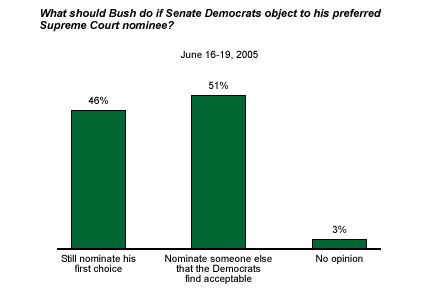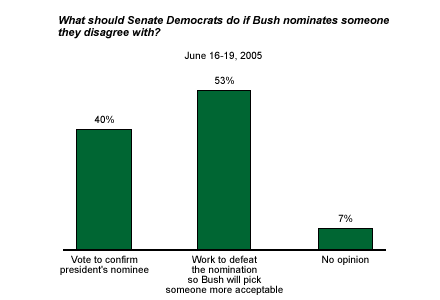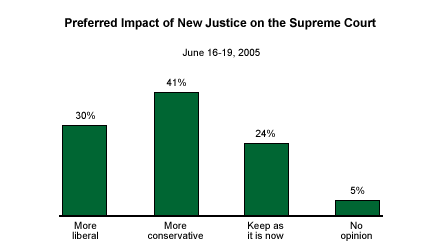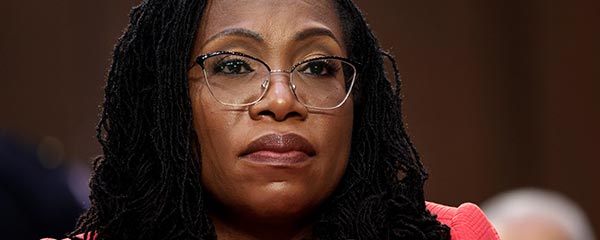The heated rhetoric swirling around President George W. Bush's nomination of John Bolton for U.S. ambassador to the United Nations, as well as the filibuster fracas over the president's federal judicial nominations, have offered a preview of how future battles over Supreme Court nominations might be waged.
It is inevitable that, should U.S. Supreme Court Chief Justice William Rehnquist retire at the end of the current court term (as some have speculated), his departure will set off a political brawl between Bush, who will try to replace him with an equally conservative justice, and the Senate Democrats, who will demand someone more liberal.
How will Americans react to such an encounter? A recent Gallup Poll* tested Americans' tolerance for political disagreement over the next Supreme Court appointment, and found that, ideally, Americans want Bush and the Senate Democrats to reach consensus.
Asked whether Bush should stick with his first choice to fill a vacancy on the Supreme Court or choose someone more palatable to the Democrats if the Democrats object to his first choice, a slim majority of Americans -- 51% -- opt for the latter. Less than half -- 46% -- believe Bush should still nominate his first choice if that person proves to be controversial.

(The fiction here is that Bush could be satisfied with someone whom the Democrats also find acceptable. But reacting to that assumption, Americans think Bush should be willing to yield on his first choice.)
What about the Democrats? Should the Democrats in the Senate confirm any Bush Supreme Court nominee so long as that person is legally and ethically qualified, or should the Democrats work to defeat a nominee whom they disagree with politically in order to compel the president to pick someone more acceptable?
The same CNN/USA Today/Gallup poll, conducted June 16-19, 2005, finds Americans siding more with the Democrats than with Bush when given this choice. Fifty-three percent say the Democrats should work to defeat a nominee whom they disagree with on important issues, while just 40% say they should vote to confirm such a nominee.

Clearly Americans don't think the Senate Democrats should rubber-stamp just anyone Bush chooses for the job of Supreme Court justice. They would prefer to see the two sides work (perhaps fight) until they arrive at someone both can support.
Rehnquist Vacancy Should be Filled by Another Conservative?
Complicating the matter, neither Bush nor the Senate Democrats has a mandate from the public over the political direction of the Supreme Court. The largest segment of Americans, 41%, says that in the event of a vacancy, they would like Bush to nominate someone who will make the court more conservative than it currently is. Another 30% would like him to make the court more liberal than it is, while 24% want him to keep the court as it is now.
Of course, if Rehnquist were to retire, this suggests that Americans would want Bush to nominate another conservative justice. That is because a total of 65% of Americans either want the court to remain as it is or become more conservative. But by the same token, were Justice John Paul Stevens or some other liberal member of the court to create a vacancy, 54% would prefer a liberal replacement.

Bottom Line
In 1987, Ronald Reagan nominated Judge Robert Bork to fill the vacancy left by Justice Lewis F. Powell Jr. Bork's views, particularly on the right to privacy and judicial restraint, outraged liberals, and he was ultimately rejected on a 58-42 vote by the then Democrat-controlled Senate. Reagan later nominated Judge Anthony Kennedy (who was perceived as a more moderate conservative than Bork), and he was easily confirmed.
The current data suggests that Americans today would applaud how that process unfolded. But, according to the Washington Post, some conservative leaders who assembled in Washington, D.C. in April called for Kennedy to be impeached over his perceived liberal (and what they view as unconstitutional) votes. To say Kennedy has been a disappointment to conservatives would be an understatement.
Bush won't want to nominate a Kennedy of his own, and therefore it is doubtful he will yield very easily to the Democrats if a battle ensues over his first choice. A major difference between 1987 and today is that the Republicans are in the majority and will most likely confirm anyone Bush chooses. However, without a 60-vote majority, Bush still has to contend with the Senate Democrats who will threaten to block a confirmation vote with a filibuster.
If the dilemma is resolved by a "nuclear" maneuver, such as changing the filibuster rule for judicial confirmations, and the political atmosphere in Washington is forever poisoned, Americans may be left wondering why the two sides couldn't have compromised their hard-line positions, and simply settled on someone tolerable to both sides.
*Results are based on telephone interviews with 1,003 national adults, aged 18 and older, conducted June 16-19, 2005. For results based on the total sample of national adults, one can say with 95% confidence that the margin of sampling error is ±3 percentage points.
In addition to sampling error, question wording and practical difficulties in conducting surveys can introduce error or bias into the findings of public opinion polls.
